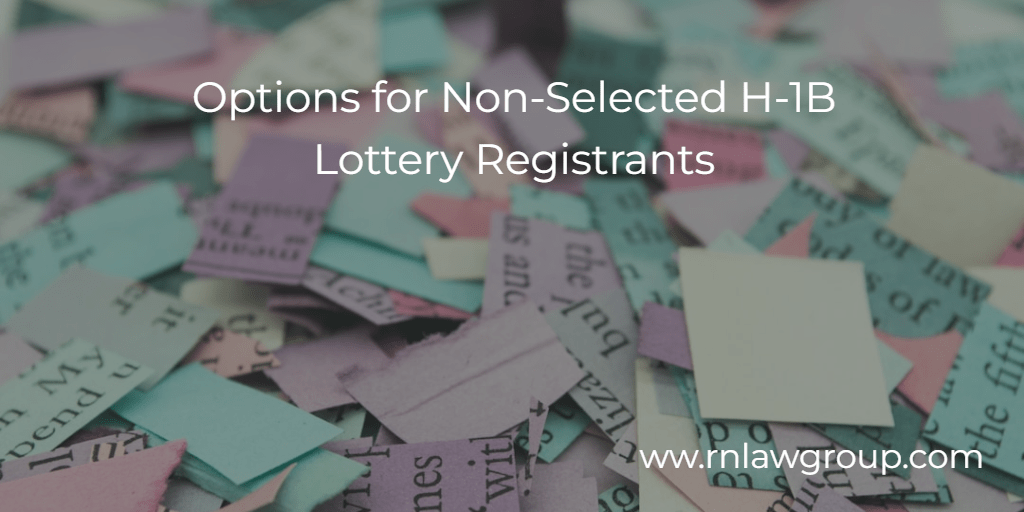
Options for Non-Selected H-1B Lottery Registrants
On April 1, 2024, USCIS announced that it had completed all the selections for this year’s H-1B lottery, with results being updated in the USCIS online accounts for employers and legal representatives.
For registrants who were not selected, it is important to understand the remaining options and to take necessary steps to maintain or change their status in the U.S. before their current status expires.
Additional Selections this Year?
There is a possibility that USCIS could make another round of selections later this year, if a significant number of applicants chosen in March do not have a petition filed on their behalf by June 30. Additional rounds of selections have occurred in most years since the electronic lottery registration was implemented in 2020; if there is a second round, those results have usually become available in late July or early August, after USCIS has confirmed the number of cap-subject petitions for the first round of selections.
While additional selections are always possible, the likelihood this year is probably lower than in prior years, due to the new beneficiary-centric selection system USCIS implemented this year. That, in addition to other USCIS efforts this past year to finally investigate fraudulent and duplicate filings, increases the likelihood that most selections from this first round will result in filed cap-subject petitions by June 30, and no further lottery selections by USCIS.
F-1/OPT
Non-selected lottery registrants in F-1 status who are currently in their post-completion Optional Practical Training (OPT) period will need to continue their training in order to maintain proper F-1 status. If they are eligible for the 2-year STEM extension, they should work with their school to ensure the I-765 renewal application is timely filed to continue their OPT employment authorization.
For those who have remaining OPT employment authorization beyond April 2025, the most likely route will be to continue their OPT and request re-submission in next year’s lottery, either with their current employer or a new employer.
For those whose OPT will expire prior to April 2025, if they intend to remain in the U.S., the main options are re-enrolling in a new program of study in order to continue in F-1 status, or changing to another status if eligible (discussed below). If choosing to re-enroll, it is important to apply and coordinate early with the school’s DSO to ensure the start date of the new program is within 5 months of the end of the 60-day grace period following the EAD expiration.
It is also important to note that work authorization typically cannot be granted by the school within the first year of study, unless the employment is an integral part of the degree program in those first 2 semesters. This exception has been interpreted very narrowly by USCIS and the State department, and most programs that purport to grant “day 1 CPT” usually do not qualify for the exception. Re-enrolling students are therefore strongly cautioned to carefully select the program for re-enrollment and the implications on their future immigration plans.
Cap-Exempt H-1B
Certain employers are exempt from the H-1B cap, meaning they are not required to submit their first-time H-1B beneficiaries through the lottery. These employers can file an H-1B petition on behalf of a beneficiary at any time during the year, with a start date effective as of the petition approval (instead of October 1). If non-selected registrants can secure a job offer from a cap-exempt employer, they can potentially change to H-1B status without the need to wait for the following year’s lottery. Furthermore, they may still be able to work concurrently for the cap-subject employer that registered them in the lottery, as long as they maintain H-1B status with the cap-exempt employer.
H-4, L-2, E-1/2/3, O-3, F-2 and other Dependent Status
For non-selected registrants whose spouse holds valid nonimmigrant status, changing to a dependent visa may allow them to remain in the U.S. long enough to be re-submitted in next year’s H-1B lottery. Certain dependent statuses (L-2 and E-1/2/3) are work authorized “incident to status,” meaning they don’t require a separate EAD in order to work. H-4 spouses would need to file an I-765 application for an EAD card, and would only be eligible if their H-1B spouse is the beneficiary of an approved I-140 petition. Other dependent visa statuses (such as O-3 and F-2) are not eligible for work authorization.
O-1 Extraordinary Ability
Highly-accomplished applicants may benefit from an evaluation of their credentials to see if they are a candidate for the O-1 visa. The O-1 visa is for aliens of “extraordinary ability,” so the threshold to qualify is considerably higher than the H-1B visa, and it still requires employer sponsorship. However, there is no lottery selection required to apply for an O-1 visa, meaning an employer can file the O-1 petition on behalf of the applicant at any time during the year, and the O-1 status would be effective as of the petition approval.
Nationality-Specific Visas
Certain work visa categories for professionals are available to nationals of specific countries, based on the U.S.’s agreements with those countries. These visas include:
- TN for Canadian and Mexican nationals;
- E-3 for Australian nationals; and
- H-1B1 for Singaporean and Chilean nationals.
The requirements for these visa categories are very similar to those for the H-1B, but do not require undergoing a lottery process. They do still require employer sponsorship, but can often be applied for at a U.S. consulate abroad or directly at a U.S. port-of-entry, allowing employers to forego the cost and processing time of filing a petition with USCIS.
PERM-Based Permanent Residency
For individuals from certain countries whose employers are supportive of the green card process, they may be able to forego H-1B status completely by applying directly for permanent residency from F-1 or other nonimmigrant status. For most positions that require the employer to undergo the PERM labor certification process, this strategy would require a very early start on the employer’s side, in order to complete the PERM and I-140, and reach the adjustment of status stage before the applicant’s OPT period expires.
The green card backlog unfortunately negates this option for Indian and Chinese nationals, even if the PERM is initiated immediately by an OPT employer. Furthermore, the growth of PERM processing times decreases the viability of this option, even for nationals of non-backlogged countries. This route will therefore primarily be an option for individuals whose country of birth is not China or India, whose degree is in a STEM field (and are therefore eligible for the 2-year OPT extension), and whose employers begin the PERM process very early, within the first year of OPT employment.
Self-Petition Green Card Options
Individuals from non-backlogged countries can also consider certain self-petition green card options if they are considering foregoing H-1B status altogether, and can start the process early enough to apply for adjustment of status before their current status expires. The EB-2 National Interest Waiver and the EB-1A extraordinary ability categories do not require employer sponsorship and are eligible for premium processing, eliminating the 18-24 months needed for an employer-sponsored PERM application.
Non-selected lottery registrants should begin planning now to ensure they have options in place in case there are no further H-1B lottery selections this year. They are encouraged to consult with qualified immigration counsel to determine the solutions that best fit their situation.
By: Rebecca Chen
Rebecca Chen is a Partner at Reddy & Neumann. Her representation includes advising clients throughout the non-immigrant and immigrant visa application process, from initial filing, responding to various requests for evidence, and processing at overseas consulates. Her years of experience in the immigration field have made her a knowledgeable resource for complex business immigration matters.

